Hispanolistic/E+ by using Getty Pictures
No investor desires to touch Compass (NYSE:COMP) ideal now, and the explanations for that are straightforward to fully grasp. It really is a progress stock that is at the moment getting rid of dollars, which is a single of the worst spots to be in in the course of the risky 2022 marketplace. On major of that, it can be a true estate corporation – and with growing prices and continued stock tightness, all signals are pointing to a slowdown in transaction volumes, maybe to commence in the back 50 % of this yr.
But as regular, the current market is taking a extremely brief-sighted approach to this stock. When I get a move back from the shorter-phrase sound on Compass, I still see a business that has speedily boosted alone to the best of the U.S. authentic estate current market in a relatively small number of a long time. It has come to be a residence brand identify for both residence buyers and sellers, and has managed to carry on getting current market share in an era in which more company is supposedly shifting to discounted brokerages like Redfin (RDFN).
Yr to day, shares of Compass have get rid of 40% of their benefit compared to highs previously mentioned $17 that Compass notched final August, the inventory is down by more than two-thirds.
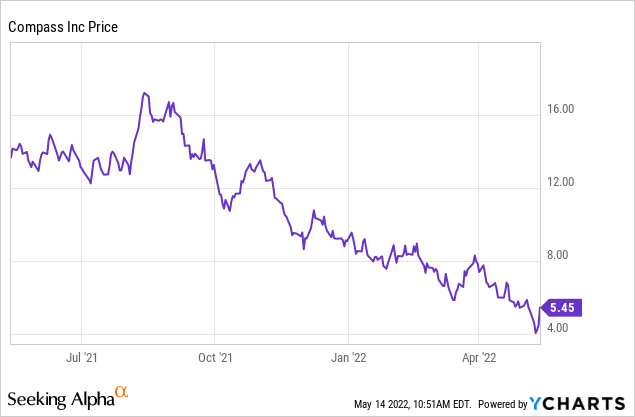
The Compass bullish thesis revisited
Supplied the steep drop in Compass inventory more than the earlier couple months, irrespective of the reality that fundamental performance continues to keep up, I’m upgrading my check out on the inventory to robust obtain. I advocate that buyers double down on this dip as I have, and even though Compass could have a rocky several months in advance as real estate action potentially slows down (even though I might argue this concern is by now baked into its stock cost), it’s however very well-positioned to be a extensive-time period winner.
Here’s a complete rundown of the factors to be bullish on Compass:
- Within just a couple a long time, Compass has become a dominant brokerage. Compass’ market share of U.S. actual estate transactions is growing promptly to ~6%. By now deeply embedded into main coastal marketplaces, Compass is more not long ago pushing into new office possibilities in the Midwest. There is certainly continue to space for even more growth: Even after the new market place exercise this yr, Compass is however penetrated into less than fifty percent of the U.S. populace.
- Tertiary revenue prospects. Lately, Compass has been opening the door to new monetization chances, which include beginning its own title enterprise. This positioning assists Compass derive extra wallet share from authentic estate transactions as a full. Compass has commented that attach premiums on these tertiary services are mounting. Compass estimates its U.S. TAM is $240 billion, of which only $95 billion and the relaxation is coming from adjacent expert services.
- Solid branding. Compass constructed a brand all over remaining a whole-provider, high-good quality actual estate brokerage, pretty equivalent in model and profile to competition like Berkshire Hathaway Residence Products and services or Sotheby’s. This gives the business a extremely solid distinguisher in opposition to other tech-first rivals like Redfin.
- Scalable system. Compass’ most important costs lie in the R&D invest to provide its technologies system for Compass brokers, as properly as the product sales and promoting costs of advertising its brand to homebuyers/sellers and potential new brokers. These fees are scalable: as Compass’ scale grows, and as agent productivity grows (the common Compass agent generates 19% more income in the second calendar year), Compass will be able to increase its profitability margins, which we have presently observed in the firm’s most recent effects.
Observe as nicely that Compass has guided to “at the very least breakeven” altered EBITDA this yr on a income profile of $7.6-$8. billion (flat to previous calendar year, in which the organization produced $2 million of adjusted EBITDA), and that by 2025, the enterprise is aiming to create $1.2 billion of adjusted EBITDA. We’ll study the math behind this in the upcoming section.
Compass outlook (Compass Q1 earnings deck)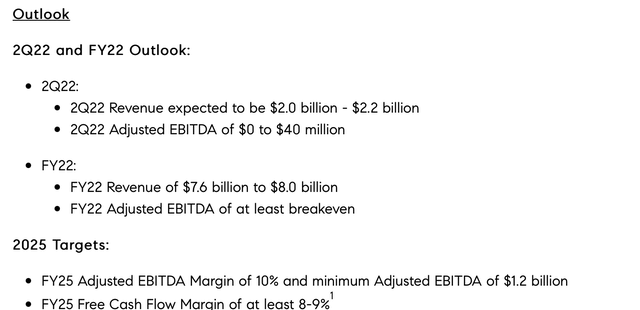
Meanwhile, at current share selling prices around $5, Compass trades at a sector cap of just $2.33 billion. After netting off the $475.9 million of cash on Compass’ most recent balance sheet, the company’s resulting organization value is $1.85 billion. This indicates Compass is investing at a portion of this year’s predicted income, and at a <2x multiple of its 2025 targeted adjusted EBITDA.
There’s a huge opportunity here to be seized: don’t miss the chance while the entire market is looking the other way.
The path to profitability lies in adjacent services
One of investors’ biggest criticisms with Compass is that the company effectively bought its growth. This is, admittedly, partially true: Compass achieved tremendous market share so quickly because it took the approach of buying out existing brokerages and slapping the Compass logo on them. The argument that Compass makes in defense of this strategy, however, is that agent productivity rises over time (especially as agents are onboarded onto the Compass platform and brand) and that it will wring out profits on its acquisitions over time.
In 2021, the company achieved breakeven adjusted EBITDA margins. By 2025, the company aims to grow its revenue base by ~50% to ~$12 billion, and generate ~10% adjusted EBITDA margins on that revenue.
Compass operating model (Compass Q1 earnings deck)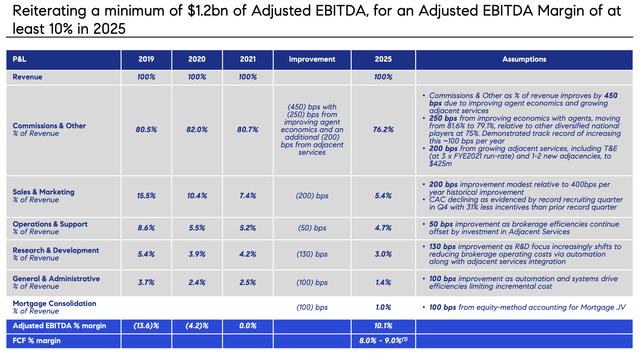
As can be seen in the chart above, the majority (450bps) of this adjusted EBITDA expansion from flat to ~10% margins is expected to be derived from better transaction economics. Of particular importance to Compass’ strategy going forward is expanding its adjacent services in other words, offering title, escrow, and mortgage services to the buy-side of its transactions.
The chart below illustrates the incrementally of these offerings. Title and escrow alone can nearly double Compass’ net revenue per transaction, and mortgage offerings through the company’s new OriginPoint subsidiary can deliver substantially more than that.
Compass adjacent services (Compass operating model)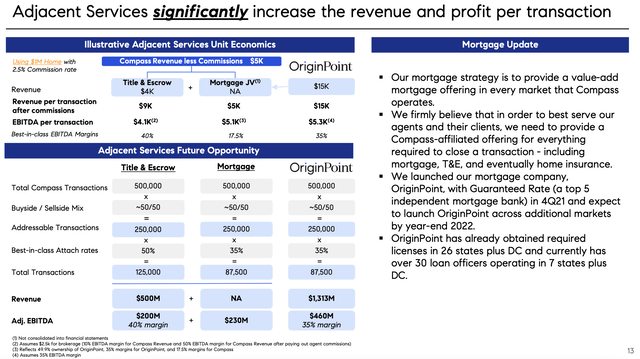
Note that these are relatively newer offerings. OriginPoint originated its first mortgages just in Q4. And in May, Compass acquired a title company called Consumer’s Title Company of California, which is licensed in every county in the state of California. At present, title and escrow services are only used on a mid-single digit percentage of Compass’ buy-side transactions, pointing to massive opportunity for the company to continue to cross-sell this product with its agents.
Growth still robust
And despite fears of a near-term housing market collapse, we haven’t seen any deterioration just yet in Compass’ results.
In Q1, Compass grew its revenue at a robust 26% y/y pace to $1.4 billion, representing a Q1 record for the company. The chart below shows as well that Compass ended Q1 at a 5.8% trailing twelve-month market share of U.S. real estate, up 150bps y/y. For Q1 alone, Compass’ market share was even higher at 6.1%, up 90bps versus 5.2% in the year-ago Q1.
Compass growth metrics (Compass Q1 earnings deck)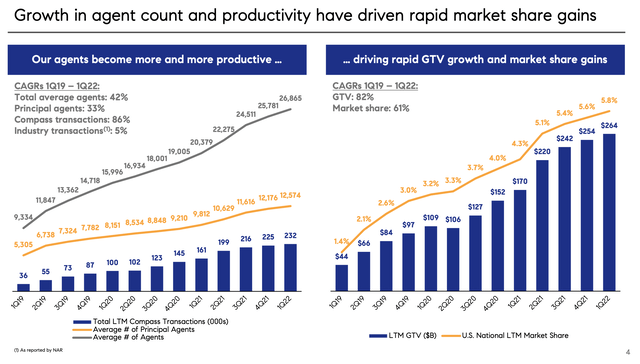
Agent productivity also remains incredibly high. Compass isn’t just growing by adding more agents to its network, its agents are also producing much more than the industry average. As shown in the chart below, the average Compass agent generated $10.6 million in gross transaction value over the past twelve months – which is 3.5x more than the typical agent in the industry.
Compass agent productivity (Compass Q1 earnings deck)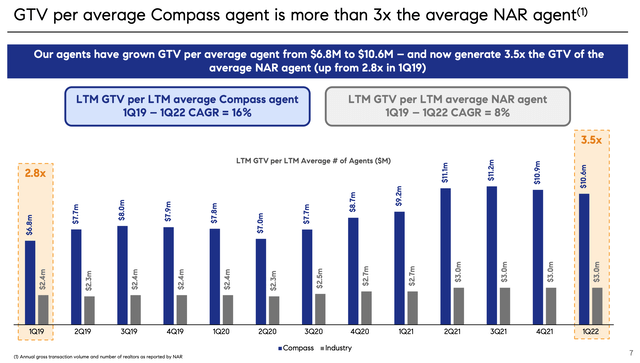
Here’s some helpful anecdotal commentary from Compass’ outgoing CFO Kristen Ankerbrandt on how the company is seeing the real estate market shape out for the rest of the year, made during her prepared remarks on the Q1 earnings call:
The first six weeks of the second quarter have resulted in tougher times across all industries. These headwinds along with constrained inventory contributed to a slower start to the second quarter than we expected. As a result our Q2 revenue outlook was affected as you will see in our second quarter guidance.
But despite uncertainty in the current macro environment, we still expect market growth in our markets in 2022 as a result of strong continued demand and historica
lly low inventory that is driving prices higher. Home prices would have to reverse their current upward trend and fall dramatically to turn market growth negative. We do not believe this will occur particularly with prices in our markets continuing to increase.
Key takeaways
I remain focused on the long-term opportunity for Compass to continue gaining market share and driving significant margin expansion through improved agent productivity and cross-selling adjacent services. The long-fragmented and localized real estate industry is moving toward national consolidation, and Compass has emerged as the leading national brand. Stay long here and buy the dip.
